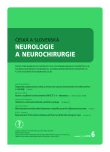New-onset refractory status epilepticus and considered spectrum disorders (NORSE/ FIRES)
Authors:
K. Česká; O. Horák; H. Ošlejšková; Š. Aulická
Authors‘ workplace:
Klinika dětské neurologie LF MU a FN Brno, Centrum vysoce specializované péče pro farmakorezistentní epilepsie MZ ČR, Brno
Published in:
Cesk Slov Neurol N 2018; 81(6): 658-662
Category:
Review Article
doi:
https://doi.org/10.14735/amcsnn2018658
Overview
New-onset refractory status epilepticus (NORSE) is defined as status epilepticus in a patient without active epilepsy or other preexisting relevant neurological disorder. It is characterized by refractory epileptic seizures, without a clear active structural, toxic, or metabolic cause. In most cases, the disease is preceded by mild febrile illness. Very frequently, the ethiology of NORSE can not be proven (cryptogenic NORSE). In a minority of cases is causal autoimmune encephalitis and viral infection of CNS. Conventional antiepileptic medications show very limited success. Therapy includes immunotherapy, ketogenic diet or another non pharmacological options. The long-term prognosis of patients is variable, in most cases cognitive impairments and epilepsy are present.
Key words:
new-onset refractory status epilepticus – clinical presentation – diagnostic protocol – therapy
The authors declare they have no potential conflicts of interest concerning drugs, products, or services used in the study.
The Editorial Board declares that the manuscript met the ICMJE “uniform requirements” for biomedical papers.
Sources
1. Gaspard N, Hirsch LJ, Sculier C et al. New-onset refractory status epilepticus (NORSE) and febrile infection-related epilepsy syndrome (FIRES): state of the art and perspectives. Epilepsia 2018; 59(4): 1– 8. doi: 10.1111/ epi.14022.
2. Marashly A, Lew S, Koop J. Successful surgical management of new onset refractory status epilepticus (NORSE) presenting with gelastic seizure in a 3 year old girl. Epilepsy Behav Case Rep 2017; 8: 18– 26. doi: 10.1016/ j.ebcr.2017.05.002.
3. Gaspard N, Brandon PF, Alvarez V et al. New-onset refractory status epilepticus. Etiology, clinical features, and outcome. Neurology 2015; 85(18): 1604– 1613. doi: 10.1212/ WNL.0000000000001940.
4. Gal CRE, Jumma O, Mohanraj R. Five cases of new onset refractory status epilepticus (NORSE) syndrome: Outcome with early immunotherapy. Seizure 2013; 22(3): 217– 220. doi: 10.1016/ j.seizure.2012.12.016.
5. Marečková I, Vojtěch Z, Procházka T et al. Případ de novo vzniklého super-refrakterního epileptického statu. Neurol Praxi 2015; 16(6): 366– 369.
6. Lizuka T, Kanazawa N, Kaneko J et al. Cryptogenic NORSE. Its distinctive clinical features and response to immunotherapy. Neurol Neuroimmunol Neuroinflamm 2017; 4(6): e396. doi: 10.1212/ NXI.0000000000000396.
7. Wilder-Smith EP, Lim EC, Teoh HL et al. The NORSE (new-onset refractory status epilepticus) syndrome: defining a disease entity. Ann Acad Med Singapore 2005; 34(7): 417– 420.
8. NORSE Institute. Norse diagnostic checklist. [online]. Available from URL: https:/ / static1.squarespace.com/ static/ 56433eade4b0b66656c0301c/ t/ 58b5dfa36b8f5b9a4 2283592/ 1488314276155/ Annotated+NORSE+Diagnostic+Checklist+pdf.pdf .
9. van Baalen A, Hausler M, Plecko-Startinig B et al. Febrile infection-related epilepsy syndrome without derectable autoantibodies and response to immunotherapy: a case series and discussion of epileptogenesis in FIRES. Neuropediatrics 2012; 43(4): 209– 216. doi: 10.1055/ s-0032-1323848.
10. Fox K, Wells ME, Tennison M et al. Febrile infection-related epilepsy syndrome (FIRES): a literature review and case study. Neuroradiogn J 2017; 57(3): 224– 233. doi: 10.1080/ 21646821.2017.1355181.
11. Aulická Š, Aulický P, Česká K et al. Management konvulzivního status epilepticus v dětském věku. Anesteziol Intenziv Med. In press 2018.
12. Li J, Saldivar Ch, Maganti RK. Plasma exchange in cryptogenic new onset refractory status epilepticus. Seizure 2013; 22(1): 70– 73. doi: 10.1016/ j.seizure.2012.09.011.
13. Kantanen AM, Reinikainen M, Parvianen I et al. Long-term outcome of refractory status epilepticus in adults: a retrospectice population – based study. Epilepsy Research 2017; 133: 13– 21. doi: 10.1016/ j.eplepsyres.2017.03.009.
Labels
Paediatric neurology Neurosurgery NeurologyArticle was published in
Czech and Slovak Neurology and Neurosurgery

2018 Issue 6
Most read in this issue
- Diagnostics, symptomatology and findings in diseases and disorders of the autonomic nervous system in neurology
- New-onset refractory status epilepticus and considered spectrum disorders (NORSE/ FIRES)
- Clinical results of cervical discectomy and fusion with anchored cage – prospective study with a 24-month follow-up
- Pragnancy and multiple sclerosis from a neurologist’s point of view
